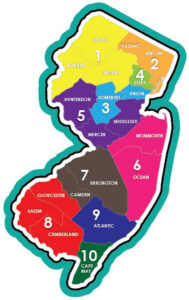Family Advisory Council (FAC)/ Regional Family Support Planning Councils
1. Who are the Regional Family Support Planning Councils?
The Regional Family Support Planning Councils (RFSPCs) were created in accordance with the Family Support Act of 1993. They consist of family members who care for and/or support their loved ones with intellectual/developmental disabilities.
The mission of the RFSPCs is “to empower and energize families to advocate for a lasting family-centered support system and community living for people with intellectual/developmental disabilities.”
2. What are the main roles of the Regional Family Support Planning Councils? What do they do?
The main role of the RFSPCs is to be the voice of fellow families in their regions. Therefore, RFSPCs collect data, monitor and evaluate the system, work with other advocacy groups, and make recommendations to the State of New Jersey. Specifically, each region hosts public forums/providers fairs at least annually. Members meet on a regular basis, usually once a month.
3. Can I attend a local meeting? How can I find my Regional Family Support Planning Council?
Yes, local meetings are open to the public and all families are welcome to attend. There are 10 regions throughout the State of New Jersey:

Council #1: Sussex, Warren, Morris
Council #2: Bergen, Hudson, Passaic
Council #3: Somerset, Union
Council #4: Essex
Council #5: Hunterdon, Middlesex, Mercer
Council #6: Monmouth, Ocean
Council #7: Burlington, Camden
Council #8: Cumberland, Salem, Gloucester
Council #9: Atlantic
Council #10: Cape May
Their contact information and local meeting schedule can be found here. Prior to attending a meeting, families are strongly encouraged to contact their local council via email as meeting format, locations and dates are subject to change.
4. Are your meetings virtual or in-person?
Most of the regional meetings are held virtually. Our quarterly statewide meetings are held in a hybrid form, meaning attendees can choose to attend virtually or in-person.
5. What are the qualifications for becoming a Regional Family Support Planning Council member?
By law, you must be a family member of a person with an intellectual/developmental disability. Also, RFSPC members should be willing to:
• Make a commitment to attend all local and statewide meetings
• Organize public forums/providers fairs in their region
• Deliver the voice of families to local and state officials, legislators and stakeholders to improve the service delivery system
6. Do I get paid as a Regional Family Support Planning Council Member?
No, Regional Family Support Planning Council Members serve without compensation (salary), but reimbursement for reasonable transportation and child/adult care are available.
7. What is the first step to becoming a Regional Family Support Planning Council member?
Attend your local meeting! All regions require prospective members to first attend several meetings, and then fill out a membership application. As stated above, make sure to send an email to your local council and/or the Family Support Liaison, Kerry McGrath, Kerry.McGrath@njcdd.org, 609-984-4516, to confirm meeting format (in-person or virtual), dates and locations.
8 I cannot join the RFSPC, but I want my voice to be heard.
By all means, please let us hear your voice! We want to know what families are experiencing so that we can accurately assess what is or is not working. Please send your input to your local RFSPC Chairpersons and the Statewide Coordinator, Kyoko.Coco@njcdd.org, 609-341-3112.
7. Who can become a FAC member?
In order to serve on the FAC, a family advocate MUST FIRST become a member of their local Regional Family Support Planning Council.
8. Does the FAC represent families who have children under age 21? Does the FAC work with the NJ Department of Children and Families (DCF)?
At this time, the FAC works mainly with DDD, which serves individuals age 21 and older.
However, families of children and youth with intellectual/developmental disabilities are strongly encouraged to join their local RFSPC. The RFSPCs represent families of both children and adults.
9. I am a person with a developmental disability. Can I join in the Regional Family Support Planning Councils?
Your voice is important too. Individuals and families work together, but we do sometimes have different advocacy goals. Your voice may be best heard and expressed through a self-advocate group.
Consider joining in People First New Jersey, the advocacy group created by and for people with developmental disabilities supported by the New Jersey Council on Developmental Disabilities (NJCDD). For more information, please contact Frank Latham, Frank.Latham@njcdd.org, 609-292-3453.
